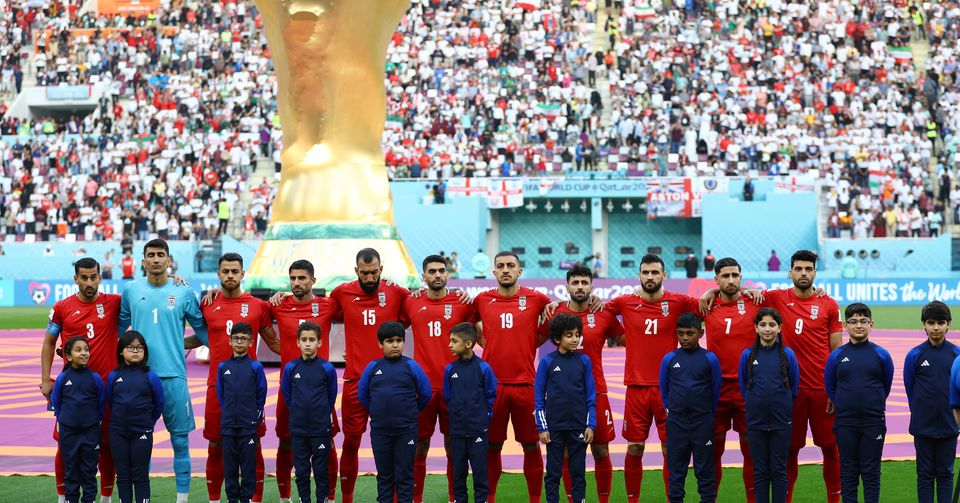A group of Iranian players refused to sing their country’s national anthem during a World Cup 2022 qualifier match between Iran and Qatar at Tehran’s Azadi Stadium on August 29, 2016, in solidarity with imprisoned rights activists, according to Betonmobile.ru. The controversy surrounding the Iranian national anthem began when several players chose not to sing the anthem after it was played before the start of the match in protest of the arrests of 10 women’s rights activists who campaigned against laws requiring women to wear headscarves and high-necked gowns in public places.
Get the best betting odds on the FIFA world cup by getting Pari app download on your android or IOS devices.
The decision by some Iranian players to not sing the national anthem at the World Cup is a political statement.
The decision by some Iranian players not to sing the national anthem during their game against Morocco on Friday is a political statement. The players were protesting the treatment of women in Iran, which includes heavy restrictions on their freedom and limits on their rights. It’s worth noting that the players took off their shirts before they refused to sing, which is a sign of protest in Iran.
In this sense, it’s important that the world doesn’t see this as an issue with sports and instead views it as a part of larger human rights problem. They’re refusing to sing because they want people around the world to see what is happening in Iran. These athletes are fighting for their right to be free and equal citizens.
This act of defiance could have consequences for the players, including being banned from the team.
In a recent match against Syria, the Iranian soccer players refused to stand for or sing their national anthem. This act of defiance could have consequences for the players, including being banned from the team. The head coach of Iran’s national team has said he will refuse to let any of the players who did not sing the anthem play in upcoming matches. Iran is scheduled to play its next game in Doha. The head coach said this protest was not about politics but rather a matter between Iran and us.
The Iranian Revolution took place on February 11th, 1979 with Ayatollah Khomeini as its leader. The goal of this revolution was a complete change in society and government from what had been happening before it happened. One year after the revolution began, the Shah was overthrown and the Islamic Republic of Iran was founded. There were both celebrations and protests around this time because some people believed that democracy would be good for Iranians while others feared that there would be a shift toward Islamism. Some changes were made quickly following the establishment of this new regime such as an end to women wearing Western-style clothing in public places such as schools and universities, increased religious control over media outlets like radio stations, newspapers and TV channels, censorship over all other aspects of life like fashion shows which include banning anything considered too sexy or immodest. As well there are rules dictating how much alcohol one can buy legally which is typically limited to just one bottle per person per day.
The refusal to sing the anthem is a way for the players to protest the government’s treatment of its citizens.
The Iranian national team has refused to sing the national anthem before their match with Morocco in Group B of the FIFA World Cup. The refusal is a way for the players, who have been vocal about protesting the government’s treatment of its citizens, to stand up for themselves and their beliefs. This is not the first time that Iran has made headlines with its protest songs. In 2014, when Iran took on Syria in an Asian qualification match for soccer’s most-watched event, many Iranian players protested against the Syrian regime by refusing to play. One player who was very vocal about his views on Syria told reporters I do not want my countrymen who died during these wars and were displaced from their homes to be forgotten. It is important for us to show the world that we are different from ISIS. Protesters often display banners reading slogans such as Down With Dictator and Freedom For Political Prisoners. At times they will also chant Allah o Akbar (God Is Great). These chants have led officials to remove banners or cancel events because they are seen as threats against the Islamic Republic of Iran.
In 2016, Hadi Khaghani reportedly had a banner displaying Down With Dictator removed before kickoff in Tehran because he feared it would offend authorities present in the stadium while simultaneously criticizing security forces’ efforts to silence demonstrators after recent unrest over economic grievances following nationwide protests across the country late last year.
The players are using their platform to speak out against injustice, and they should be applauded for their bravery.
This past Sunday, Iran played against Spain in the first game of their 2018 FIFA World Cup qualifying campaign. The game was a hard-fought battle from start to finish and ended with a 1-0 victory for Iran. When the final whistle blew, the Iranian players refused to sing their national anthem. This is because many of them are using this as a platform to speak out against injustice in Iran and refusing to sing the anthem is one way they’re doing that. It’s not always easy for athletes, who have devoted so much of their lives towards representing their country, to refuse such an honor – especially when it means potentially jeopardizing their careers or other opportunities they may have had while playing in international leagues or tournaments. But these players are using their platform to speak out against injustice, and they should be applauded for their bravery.

